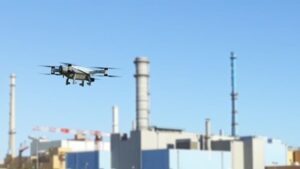
French drone startup Azur Drones is making recycled nuclear fuel sites safer by deploying its Skeyetech autonomous surveillance UAV solution to protect a huge site in The Hague.
Mostly used in the port, energy, defense and oil-and-gas sectors, Azur drones will coordinate with on-ground security teams for Orano to maintain 24-7 surveillance over the highly sensitive site.
“The Hague is a site that has high levels of protection with over 500 people dedicated to security and safety,” Emmanuel Vial, Orano The Hague Site and Material Protection department manager, said.
“It is constantly seeking improvements in these fields. As drones offer unrivalled reactivity and vision capacities, we quite naturally wanted to test this new tool as soon as the autonomous technology made it possible to simplify their use.”
Using high-definition optical and thermal sensors, Skeyetech autonomous drones fly daily surveillance and inspection missions and are directly controlled by security teams without the necessity of remote pilot training. As such, the Skeyetech drone system results in considerable time savings, specifically for the surveillance of more remote or less accessible areas. Compared to perimeter ground patrols, drone missions are faster and can speed up human reaction time in a security breach incident.
“Considering [The] Hague site extends over more than [32.2 million square feet], the drone should make it possible to increase our reactivity to events. It could also allow us to optimize our use of the teams by assigning them to high added-value tasks.” Vial said.
“We are proud to support Orano in automating its security and safety missions. The use of our tool by a major nuclear site is a great achievement for the entire Azur Drones team as it confirms the maturity of our autonomous system and our capacity to meet the highest safety standards.” said Jean-Marc Crépin, the Azur Drones CEO.
Skeyetech’s design is based on several aerospace standards, including motor redundancy, vital equipment redundancy, pyrotechnical parachute and geo-caging system. The system has logged more than 10,000 autonomous flights.
Azur received France’s first authorization for autonomous flight in 2019. Last year, the company garnered $2.9 million in new financing from a private investor for a total of nearly $29 million over four years.
Jason is a longstanding contributor to DroneLife with an avid interest in all things tech. He focuses on anti-drone technologies and the public safety sector; police, fire, and search and rescue.
Beginning his career as a journalist in 1996, Jason has since written and edited thousands of engaging news articles, blog posts, press releases and online content.
Email Jason
TWITTER:@JasonPReagan
Subscribe to DroneLife here.